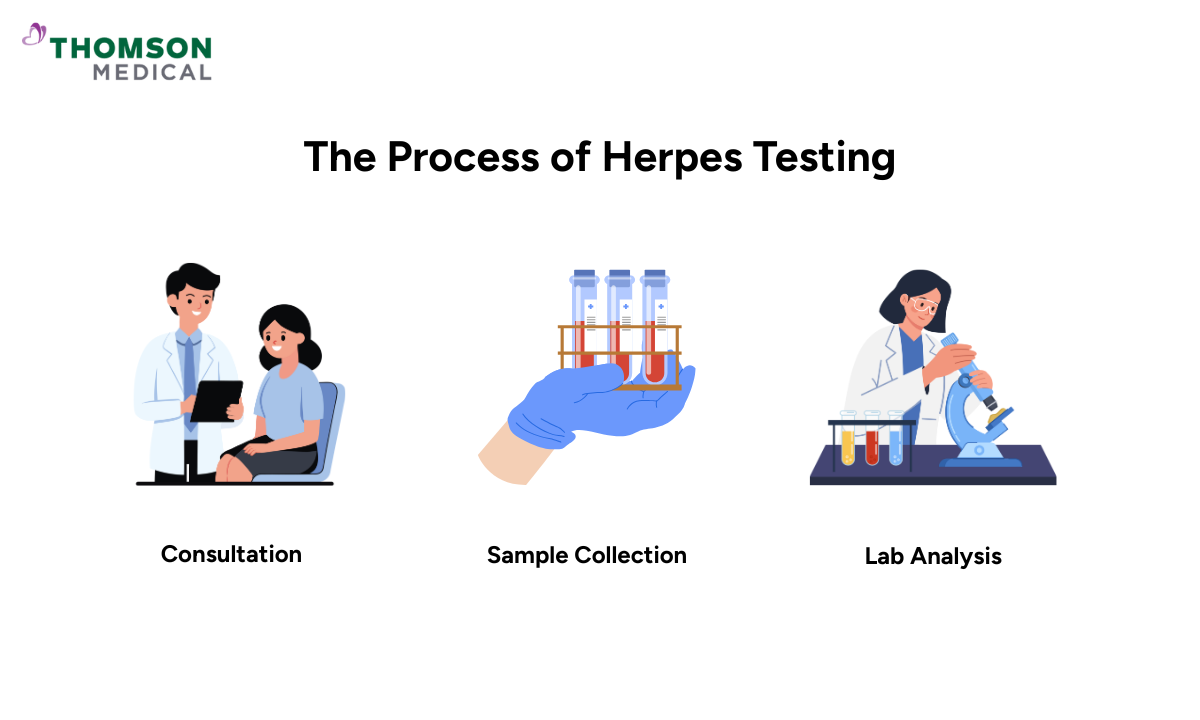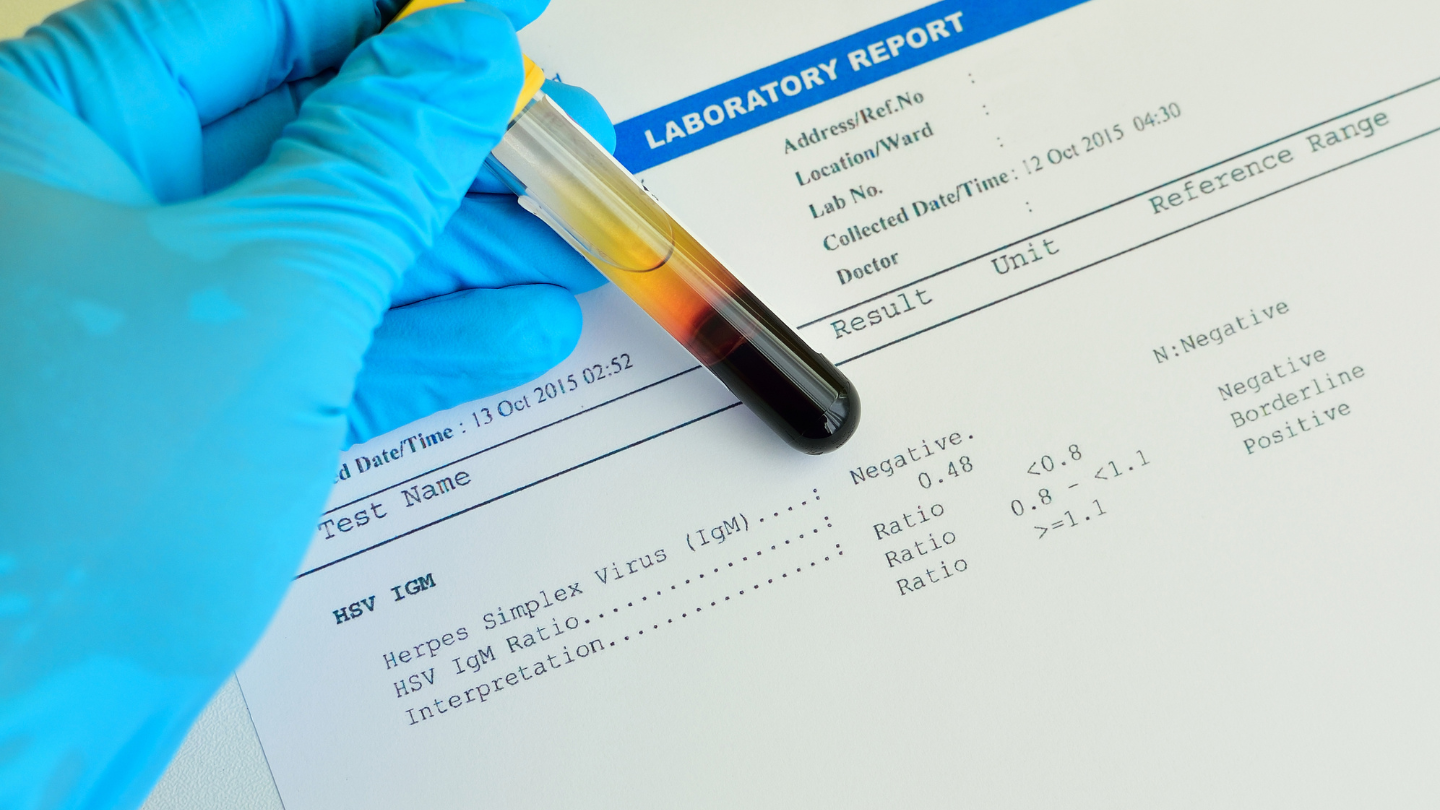Herpes is a common viral infection, but many people find it uncomfortable to talk about. While it's completely natural to have concerns, knowing what's happening in your body can help you feel more in control.
One of the best ways to understand your condition is to take herpes tests. It can make a big difference in how you manage the virus and prevent future outbreaks. Let's take a closer look at how herpes tests are done and what you can expect during the process.
How do you test for herpes?
Herpes is caused by the herpes simplex virus (HSV). There are two main types:
HSV-1:
Usually associated with oral herpes (cold sores)
HSV-2:
More commonly causes genital herpes
Skin-to-skin contact can spread the herpes virus, especially during oral or sexual activity, even when no blisters are visible. So it’s easier to get than most people think. The only way to know for sure is to get tested.
Testing for herpes helps identify the virus itself. It's also used to detect antibodies that the immune system produces after infection.
There are several types of herpes tests. Your doctor will suggest the most suitable one for you based on your symptoms and the area affected.
Common herpes tests include:
Swab test (PCR test)
Your doctor will collect a fluid sample from a blister or sore to check for HSV DNA. The swab test is the most accurate, especially when symptoms are active.
Viral culture
A sample from a sore is grown in a lab to detect the virus. Although viral culture can help confirm whether the virus is still active, this test is less sensitive than the PCR test.
Blood test (serology)
If no sores are present, your doctor may suggest a blood test to detect HSV antibodies. However, it may not be able to tell the difference between new and old infections.
Each method plays a different role depending on your symptoms. Testing early, especially during your first outbreak, is the key to helping your doctor provide prompt treatment.
Genital herpes test
Many women mistake genital herpes for skin irritation. That's why getting tested promptly is important.
Your doctor will do the test if you have symptoms such as blisters, ulcers, or sores in the genital area.
If you have sores, your doctor will collect a swab sample from an active one. This gives the most reliable diagnosis because it detects the herpes viruses directly. If no sores are present, a blood test can be used to check for past exposure to HSV.
Oral herpes test
Oral herpes (cold sores) can be tested in a similar way.
Your doctor will test the fluid from a cold sore during an outbreak to confirm whether it's HSV-1 or HSV-2.
In case there are no visible sores, your doctor will do blood tests to detect previous exposure. However, it cannot identify the exact location of infection.
What is herpes testing in Singapore like?

In Singapore, herpes tests are widely accessible, whether you're looking for genital herpes or oral herpes.
You can get tested at:
General practitioner (GP) clinics
Polyclinics
Private sexual health clinics
Hospitals and specialist clinics
The process can vary across different clinics, but here's what usually happens:
Consultation
A doctor reviews your symptoms and risk factors to determine the right test.
Sample collection
If there are visible blisters, a swab test will be done. Otherwise, your doctor may do the blood test.
Lab analysis
Depending on the test type, it usually takes 1-5 days to get the test results
It's completely natural to feel nervous, especially when it comes to a genital herpes test. It is a normal part of sexual health care. Getting tested early can help you avoid complications and protect your sexual health.
The good news is that herpes testing is confidential, and many private clinics offer discreet STI screening packages.
If you have concerns about herpes symptoms, or you just want to take a proactive approach to your sexual health, Thomson Medical is here to help. Request an appointment for testing, diagnosis, and supportive care in a judgment-free environment.
Our sexual health specialists
Loading...
What treatments are available for herpes?
Currently, there is no cure for herpes. But with the right medication and care, you can manage symptoms and reduce outbreaks.
Based on your test result, your doctor will recommend the best HSV treatment plan for you.
Herpes treatments include:
Antiviral medications (acyclovir, valacyclovir, famciclovir)
These medicines help you shorten outbreaks, reduce severity, and lower transmission risk for both genital and oral herpes.
Topical creams
They may provide some relief but are less effective than oral antivirals.
Suppressive therapy
If you experience frequent outbreaks, your doctor will suggest using daily antiviral medication to reduce recurrence and risk of transmission.
Managing your own lifestyle is the key to improving your odds. Habits such as stress management, adequate sleep, and good nutrition may help reduce outbreaks.
How much does a herpes test cost?

The cost of herpes tests in Singapore varies depending on the clinic and test type.
Swab test (PCR): SGD 100–230
Viral culture: SGD 80–150
Blood test (antibody test): SGD 40–120
Comprehensive STI screening (including Herpes): SGD 150–500
For Singapore's citizens and permanent residents, subsidised rates may be available at polyclinics.
If you have concerns about herpes symptoms or want to take a proactive approach to your sexual health, Thomson Medical is here to help. Request an appointment for testing, diagnosis, and supportive care in a judgement-free environment.
FAQ
Can herpes cause migraines?
While herpes itself does not directly cause migraines, outbreaks can sometimes trigger headaches due to an immune response or stress.
HSV rarely affects the nervous system (herpes encephalitis). If so, it is a medical emergency.
Will herpes show on an STD test?
Not always. Standard STI panels may not automatically include herpes testing. To find out what’s exactly going on, especially if you suspect genital herpes, you should request a herpes-specific test.
What can be mistaken for herpes?
Several conditions can resemble herpes sores, including:
Ingrown hairs
Pimples
Canker sores
Syphilis sores
Allergic skin reactions
A medical test is the only reliable way to confirm the herpes virus.
Which is worse, HPV or herpes?
Both HPV and herpes are common viral sexually transmitted infections (STIs). But they affect women in different ways.
HPV
HPV can cause cancer (cervical, anal, or throat), but it often clears on its own.
Herpes
It does not cause cancer, but it is lifelong and can cause recurrent painful outbreaks.
The impact also depends on the individual and the type of infection. Understanding the differences between them can help you take better care of your sexual health.
What do the first stages of herpes look like?
At the first stage, you may have some symptoms, including:
Tingling, itching or burning in the affected area.
Red bumps or blisters that turn into painful ulcers.
Flu-like symptoms such as fever or swollen lymph nodes (especially during the first outbreak).
Once you find these symptoms, don't hesitate to visit a clinic to get tested for herpes as early as possible.
Is chlamydia similar to herpes?
No. Chlamydia is caused by bacteria and can be cured with antibiotics, while herpes is a viral infection that cannot be cured but can be managed with antivirals.
The information provided is intended for general guidance only and should not be considered medical advice. For personalised recommendations and tailored advice based on your unique situations, please consult a specialist at Thomson Medical. Request an appointment with Thomson Medical today.
Reference:
Atamed.Sg. (n.d.). STD test Singapore: Tests & price list (2025). https://atamed.sg/std-test-singapore
healthscreening.sg. (n.d.). Herpes Test: Discreet & Same-Day Appointment (2025). https://healthscreening.sg/herpes-test
For more information, contact us:
Thomson Specialists (Women's Health)
Thomson Women's Clinic (TWC)
- Novena:
6592 6686 (Call), 8611 8986 (WA) - Bukit Batok:
6569 0668 (Call), 8686 3525 (WA) - Choa Chu Kang:
6893 1227 (Call), 8282 1796 (WA) Jurong:
6262 8588 (Call), 6262 8588 (WA)- Katong (female doctor):
6970 2272 (Call), 8611 9020 (WA) - Punggol:
6243 6843 (Call), 8811 0328 (WA) - Sembawang: 6753 5228
- Sengkang: 6388 8125
- Serangoon (female doctor): 6382 3313
- Tampines: 6857 6266
- Tiong Bahru: 6276 1525
